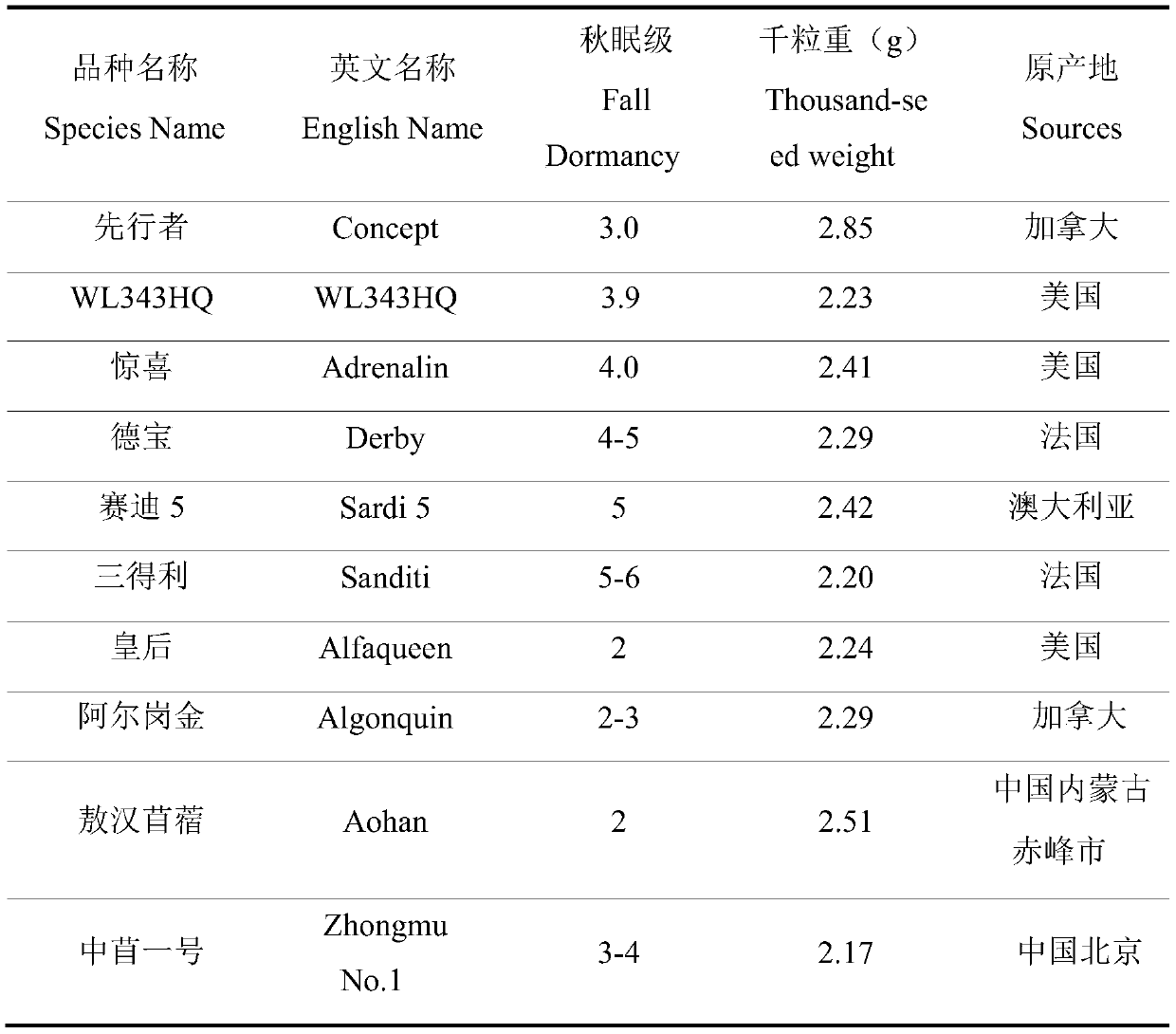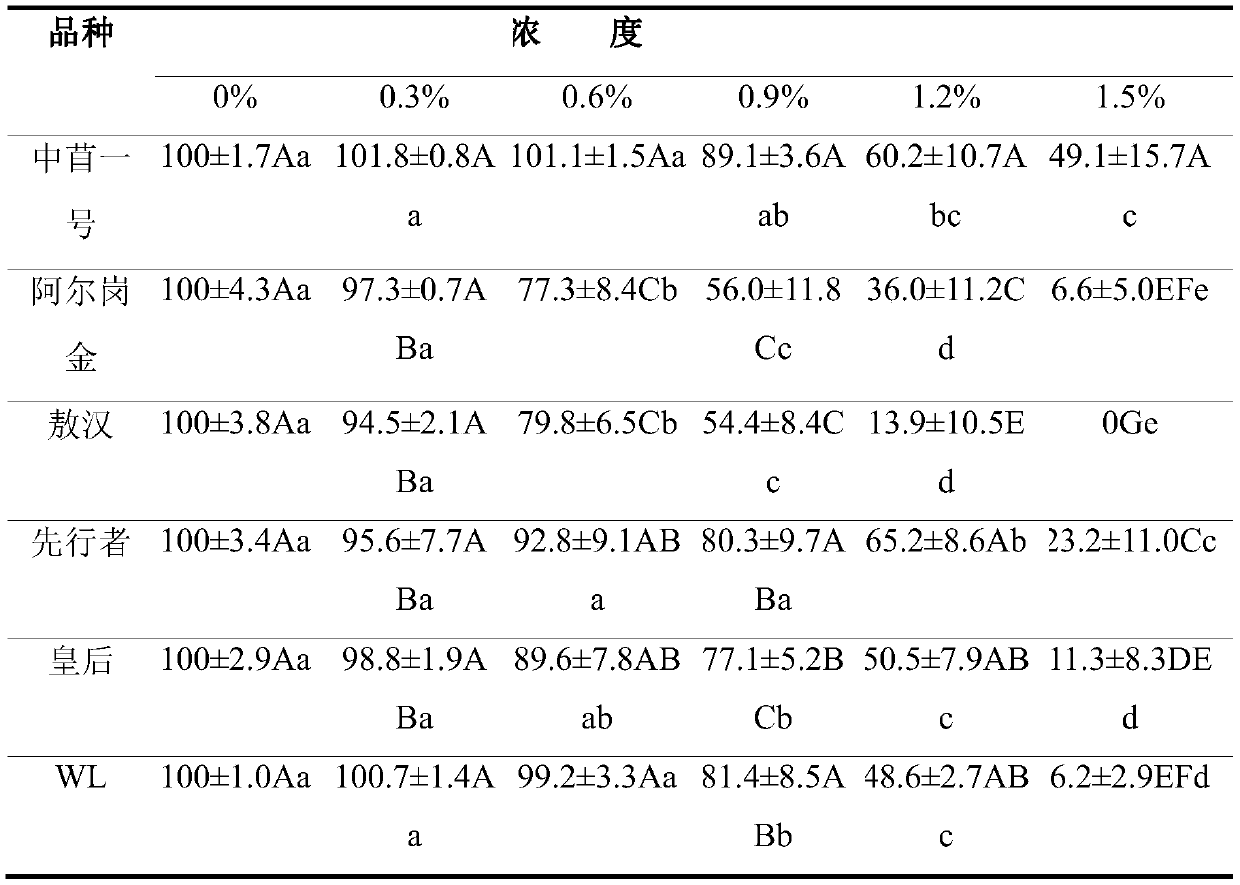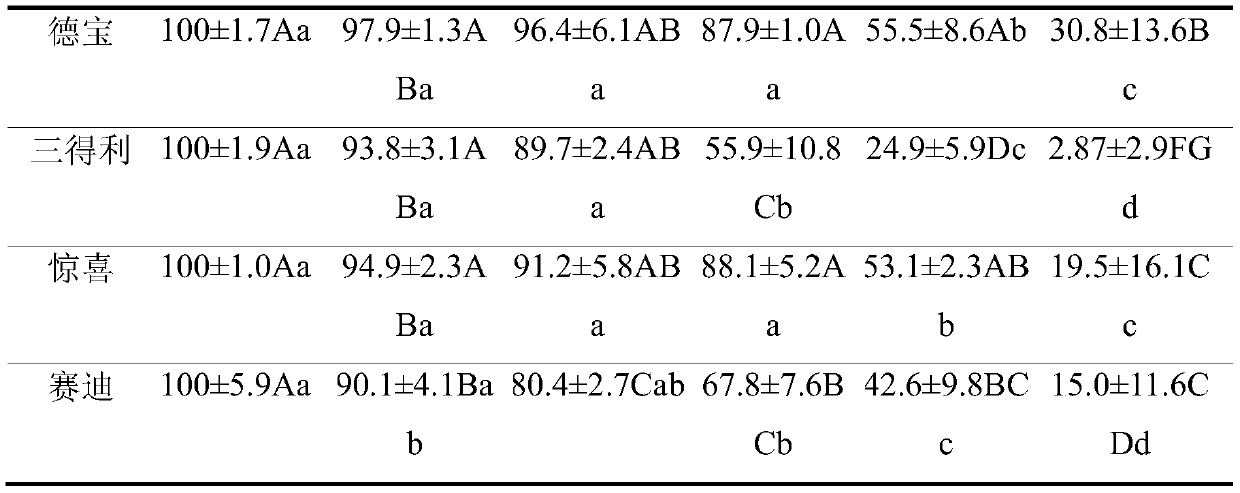A method for evaluating the salt tolerance of grass land cover seeds
A salt-tolerance and seed technology, applied in the field of plant salt-tolerance screening, can solve problems such as time-consuming, and achieve the effects of reducing labor input, spraying uniformly, and saving labor.
- Summary
- Abstract
- Description
- Claims
- Application Information
AI Technical Summary
Problems solved by technology
Method used
Image
Examples
Embodiment 1
[0121] A method for screening salt-tolerant grassland plants, using Medicago sativa as an example, comprises the following steps:
[0122] 1. Customized culture container and culture substrate
[0123] Choose a PVC control container with a diameter of 160mm. The upper opening of the container is 110mm wide, 130mm deep, and 1100mm long. Rinse, dry and set aside.
[0124] 2. Material pretreatment
[0125] Preparation of NaCl salt solution: The mass concentration method was used to prepare NaCl salt solution, with 5 concentration gradients: 0.3%, 0.6%, 0.9%, 1.2% and 1.5%, and distilled water was set as the control group (0%).
[0126] Seed selection: select 10 alfalfa varieties, specifically: the seeds of 10 alfalfa varieties Zhongmi No.1, Algonquin, Aohan, Forerunner, Queen, WL, Debao, Suntory, Surprise, and Saidi, respectively denoted as 1 to 10 groups, see Table 1 for details.
[0127] The selected seeds are required to be bright and full in color, and every 100 seeds of ...
Embodiment 2
[0187] A method for screening salt-tolerant grassland plants, using Medicago sativa as an example, comprises the following steps:
[0188] 1. Customized culture container and culture substrate
[0189] Choose a PVC control container with a diameter of 160mm. The upper opening of the container is 110mm wide, 130mm deep, and 1100mm long. Rinse, dry and set aside.
[0190] 2. Material pretreatment
[0191] Preparation of sodium bicarbonate (NaHCO 3 ) Salt solution: prepare NaHCO by mass concentration method 3 Five concentration gradients were set up for the saline solution: 0.3%, 0.6%, 0.9%, 1.2% and 1.5%, and distilled water was set as the control group (0%).
[0192] Seed selection: select 10 alfalfa varieties, specifically: the seeds of 10 alfalfa varieties Zhongmi No.1, Algonquin, Aohan, Forerunner, Queen, WL, Debao, Suntory, Surprise, and Saidi, respectively denoted as Groups 1 to 10, see Table 1 in the above examples for details.
[0193] The selected seeds are requir...
Embodiment 3
[0224] A method for screening salt-tolerant grassland plants, using Medicago sativa as an example, comprises the following steps:
[0225] 1. Customized culture container and culture substrate
[0226] Choose a PVC control container with a diameter of 160mm. The upper opening of the container is 110mm wide, 130mm deep, and 1100mm long. Rinse, dry and set aside.
[0227] 2. Material pretreatment
[0228] Preparation of sodium carbonate (Na 2 CO 3 ) salt solution: the application of mass concentration method to prepare Na 2 CO 3 Five concentration gradients were set up for the saline solution: 0.3%, 0.6%, 0.9%, 1.2% and 1.5%, and distilled water was set as the control group (0%).
[0229] Seed selection: select 10 alfalfa varieties, specifically: the seeds of 10 alfalfa varieties Zhongmi No.1, Algonquin, Aohan, Forerunner, Queen, WL, Debao, Suntory, Surprise, and Saidi, respectively denoted as Groups 1 to 10, see Table 1 in the above examples for details.
[0230] The se...
PUM
 Login to View More
Login to View More Abstract
Description
Claims
Application Information
 Login to View More
Login to View More - R&D
- Intellectual Property
- Life Sciences
- Materials
- Tech Scout
- Unparalleled Data Quality
- Higher Quality Content
- 60% Fewer Hallucinations
Browse by: Latest US Patents, China's latest patents, Technical Efficacy Thesaurus, Application Domain, Technology Topic, Popular Technical Reports.
© 2025 PatSnap. All rights reserved.Legal|Privacy policy|Modern Slavery Act Transparency Statement|Sitemap|About US| Contact US: help@patsnap.com



